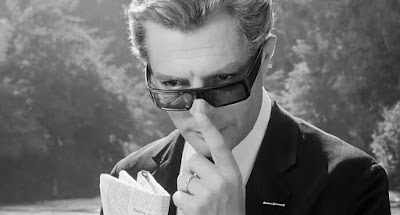Of all the accolades for this film – and it’s on pretty much every “best of” list – perhaps the Vatican’s ranking it among the best films made in the first century of cinema is the one Federico Fellini would have been most amused by. Who knows? But the answer might well be in 8½ itself, a film that is entirely about the question: “why make a film?” and about which it is probably impossible to say anything new.
So, why bother trying? There are choices to be made and this is one you can just watch, enjoy and leave alone, you’re not going to add anything to a pile of opinion 52 years deep and yet, why say anything about any film unless you feel you’re either a valuable show off of you just have to make a note of your personal response.
 |
| On the way to work |
Hang on… isn’t that Claudia Cardinale smiling at me over the ranks of Italian tourists packed onto the Gatwick Express? She’s leading me on.
 |
| Claudia |
It is ostensibly a film about a director, Guido Anselmi (Marcello Mastroianni) trying to overcome his doubts about his own credibility in order to make another movie. Throughout he’s pestered by producers and performers all anxious to work as well as an intellectual film critic Carini Daumier (Jean Rougeul) whom at one point he imagines being silenced by "hanging" (don’t worry he returns).
 |
| Rossella Falk and Anouk Aimée - funny and serious |
Mastroianni is a wonder throughout and has qualities akin to Gish and Huppert – he can show interior worlds and hold Fellini’s contradictions within his character with a stillness that belies the conflict and moving with graceful transitions between the states of confusion, hope, desperation, pity and love. What can appear as a cool demeanor very soon dissolves into apathy and inertia.
 |
| Marcello not in neutral... |
Here he takes even the most unforgiving statements form his inner critic on his chin … He is apparently making a film full of “gratuitous episodes, perhaps even amusing due to their ambiguous realism. One wonders what the author’s point is… The subject matter doesn’t even have the merits of an avant-garde film…” No wonder he “hangs” him!
 |
| Lengthy queues for holy water |
Carla is straightforward, if demanding, and doesn’t pull Guido into the deeper waters of his marriage where Luisa Anselmi (Anouk Aimée) is every inch his match. But Carla is also crowd-pleasing cinema and that’s a place the director likes to visit even though he hates himself for staying there.
 |
| Carla being straightforward, not demanding... |
Before all this, Guido wanders through the the sanitorium-cum-holiday camp accompanied by his nagging arty conscience. He finds his friend Mario Mezzabotta (Mario Pisu) who is a similar age but has left his wife to be with a younger woman, Gloria Morin (splendidly played by Barbara Steele). Gloria is highly intelligent and an art-house dream of hipster fringe, darting glance and angular black fashion: the cutting edge Guido feels he may lack.
 |
| Gloria makes Mario move |
 |
| Claudia (again) |
Guido bows in mock worship when his producer Bruno (Bruno Agostini!) arrives with his entourage but he pays homage only to buy time. As the film progresses though the money wants solid return and Guido is increasingly backed into a corner.
 |
| Earthed |
Luisa arrives with her best friend (Guido’s sister) Rossella (Rossella Falk) and the intimacy both bring make us focus on Guido’s weaknesses: he can kid us with his friends but not with his family.
 |
| Imagine space ship right here... |
Time is running out but at the screening Beauty returns as Claudia arrives to discuss her part. Guido has pinned everything on her youth re-invigorating his project but, just as he realises that he cannot use her as a substitute for his own integrity, the producers arrive. There is no escape he must face the film crew on set – film or die.
 |
| The initial rushes don't look encouraging |
But it’s the playing that holds the attention most of all – in particular Anouk Aimée is the perfect foil for Mastroianni and does much to reveal his character’s weakness and way forward.
 |
| Here's hoping |
There are many ways to consume 8½ - probably the best is from Criterion which is available direct or via Amazon. There’s also a British Blu-ray from Argent Films available here.



+colour.png)









No comments:
Post a Comment